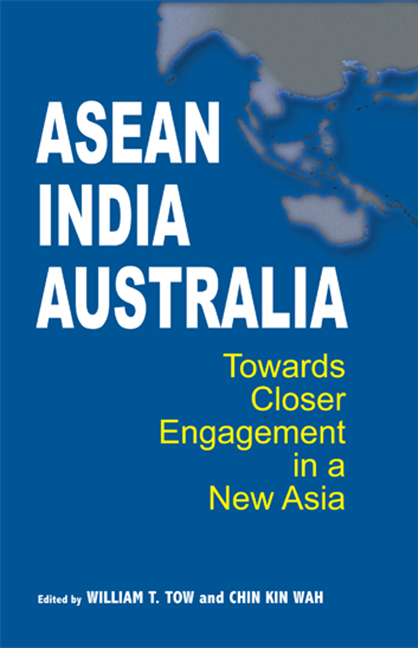Book contents
- Frontmatter
- Contents
- Preface
- Contributors
- List of Abbreviations
- Introduction
- Part I Emerging Regional Security
- Part II Energy Security
- 5 Regional Energy Security: A Challenging Objective?
- 6 Energy Security: An ASEAN Perspective
- 7 India's Perspectives on Energy Security
- Part III Climate Change
- Part IV Maritime Security
- Part V Law Enforcement/Combating International Crime
- Conclusion
- Bibliography
- Index
7 - India's Perspectives on Energy Security
from Part II - Energy Security
Published online by Cambridge University Press: 21 October 2015
- Frontmatter
- Contents
- Preface
- Contributors
- List of Abbreviations
- Introduction
- Part I Emerging Regional Security
- Part II Energy Security
- 5 Regional Energy Security: A Challenging Objective?
- 6 Energy Security: An ASEAN Perspective
- 7 India's Perspectives on Energy Security
- Part III Climate Change
- Part IV Maritime Security
- Part V Law Enforcement/Combating International Crime
- Conclusion
- Bibliography
- Index
Summary
It is evident that the years since the new millennium have seen a profound transformation of the global and Asian security environment. Resource needs, and in particular, energy, have been key drivers of this change. This reactivation of resource interests in international affairs is due to their being so central to achieving economic dynamism and successful global engagement, which have become the defining parameters of power and influence in a post-Cold War era. Energy has, as a result, risen to the top of national policy agendas and security debates. Nations are adopting positions and making choices both based on their assessments of the room to manoeuvre they have, as well as their perception of political and economic vulnerability in the international context. Perceptions of threats of embargoes, supply disruptions, and sanctions lead to more statist responses, resulting in bilateral and regional alliances; while those less prone to such perceptions adopt more market-oriented strategies to secure energy/minerals for the economy.
Most of this concern has been around oil as this is still very central to the energy mix of nations. As oil and some of the other resources key to economic growth are concentrated in a few countries, and as demand has been rising sharply, strategic analysts have been speaking of possible resource wars as the new landscape of global conflict. Others suggest that “Nothing better illustrates the dangers of resource wars than the emerging strategic landscape in Asia, where high economic growth rates have fuelled concerns and competition over raw materials and energy resources. The debate around energy currently has the following manifestations, which suggest an increased “securitization”:
“Availability” and “affordability”, which were the main characteristics of the quest for energy security earlier, have now hardened into one for “secure” energy resources.
Energy independence is becoming very important to nations and, increasingly, nations are coming to design policies by which there is less dependence on foreign sources.
Strategies pursued to secure energy — equity investments, bilateral deals and new energy ties, investments in nuclear energy — create regional and global concerns about implications of such ties and relations.
Energy choices and strategies are increasingly getting caught up in larger foreign and trade policy considerations; they often reveal a zero sum thinking and therein lie possibilities for conflict.
- Type
- Chapter
- Information
- ASEAN-India-AustraliaTowards Closer Engagement in a New Asia, pp. 111 - 128Publisher: ISEAS–Yusof Ishak InstitutePrint publication year: 2009



